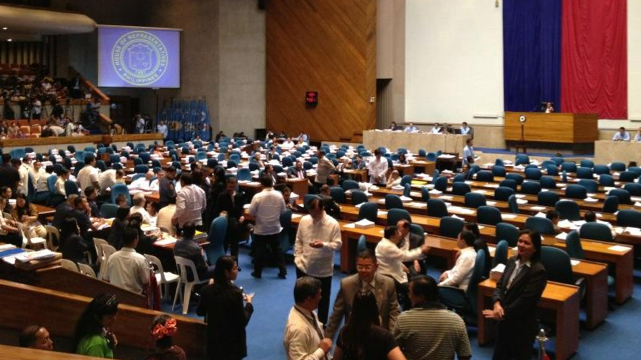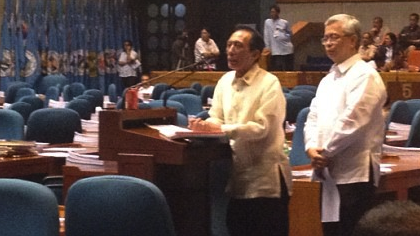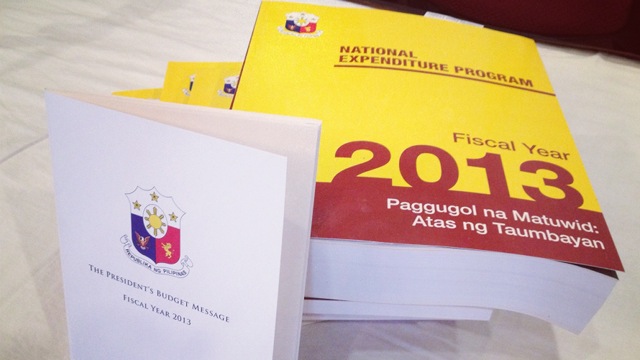SUMMARY
This is AI generated summarization, which may have errors. For context, always refer to the full article.

MANILA, Philippines – After only two weeks in plenary, the House of Representatives approved on 2nd reading before midnight on Thursday, September 20, the P2.006-trillion national budget for 2013, an election year.
The real work begins. The House leadership gave the House members until Tuesday, September 25, to submit their proposed amendments.
“The real work for the chairman and the committee, especially the staff, would start now. While our colleagues will go on break, we will start working on the amendments. This is work for us rather than break,” said Rep Joseph Emilio “Jun” Abaya, chairman of the House committee on appropriations.
Congress goes into a two-week break or until October 7 for the filing of Certificates of Candidacies (COCs). The House leadership expects to pass the budget bill on 3rd and final reading on October 15.
Speaker Feliciano “Sonny” Belmonte Jr created a commitee that will facilitate proposed amendments. Its members are Abaya, appropriations committee vice-chairpersons Negros Oriental Rep Jocelyn Limkaichong and Camarines Sur Rep Rolando Andaya Jr, senior deputy majority leader Iloilo Rep Janette Garin, and Minority Leader Quezon Rep Danilo Suarez.
Abaya said the House members who will propose additional funding for departments or specific projects have to identify where the money would come from, meaning which budget item would be slashed to accommodate increases in others.
Congress may re-align but it cannot increase the budget submitted by Malacañang. Automatic appropriations like debt-servicing may not be touched, too.
Historically, crucial amendments are inserted during bicameral conference committee hearings, where the Senate and House of Representatives consolidate their versions of the budget.
Belmonte is confident the Congress will pass the budget on time as it has remarkably accomplished in the past 3 years. This is the last budget to be approved by the 15th Congress. A new set of House members will be elected in May 2013.
Easy time

The second reading allows House members to scrutizine items in the budget. Department heads and representatives are present in plenary hearings to assist House members assigned to defend their respective budgets before the legislative chamber.
The budget that Malacañang submitted to Congress in July remains untouched. The process for the budget bill, which is about 1,000 pages thick, is different from a regular bill with usually less than 50 pages.
For regular bills, they finish committee amendments and individual amendments (made in plenary) before it is approved on 2nd reading. For budget bills, amendments are instead inserted after.
“We’ve allowed the minority especially to scrutinize, to debate, to question and to clarify [items in the budget bill],” said House committee on appropriations chairman Cavite Rep. Joseph Emilio “Jun” Abaya.
The budget bill relatively breezed through plenary. Debates were not as heated as previous years. Period of debates on the usually controversial Department of Public Works and Highways (DPWH), for example, was quickly terminated.
Deputy Minority Leader Zambales Rep. Milagros “Mitos” Magsaysay questioned the quorum early Thursday night when she was not satistified with Abaya’s explanation why her Priority Development Assistance Fund (PDAF) or pork barrel was not released. Session was suspended for a long time but when it resumed, Suarez recalled her motion and the budget deliberations proceeded. (Abaya sponsored the DBM budget.)
Because of the recent controversy on the bidding of police firearms, the Department of the Interior and Local Government (DILG) was among those that took longer in plenary.
To speed up the process, department representatives also offered to meet House members outside the plenary to explain budget items that they are interested in or have questions about.
Break down Special Purpose Funds
The biggest controversy on the proposed 2013 budget is the lumpsum funds, particularly the P317.5-billion allocation for the Special Purpose Funds. It is about 1/6th of the total budget.
Former national treasurer Leonor Briones of the Social Watch Philippines earlier called for the abolition of the entire SPF. “How could we say that the people dictate how the nation’s money should be utilized when what they see is only an illusion because there are vague budget items under the SPF. While billions of government money remain invisible because they do not pass through the deliberation process?” she said.
Minority Leader Quezon Rep Danilo Suarez also hit the lumpsum funds, particularly the P22.4-billion allotment for the vague item Priority Social and Economic Projects Fund (PSEPF), during his Turno en Contra speech opposing passage of the budget bill. But no one in the legislative chamber – including Suarez himself – raised a single question about the lumpsum funds when the period of deliberations opened in plenary.
“How can the members of the House of Representatives faithfully perform their duty if they are persuaded to approve budgetary allotments without details and are unable to monitor actual utilization of such allotments?” Suarez said in his speech.
Abaya said they will break down the specific projects under the PSEPH. It is not clear if other SPF items will also be broken down.
“An errata has been submitted. We now have details for the lump-sum fund Priority Social and Econimc Projects Fund. That will now be incorporated,” he said.
(Below is the Department of Budget and Management’s response to Social Watch Philippines. It was released on September 2.)
First time to hit P2-trillion
This is the first time the the national budget hit P2-trillion. It’s nothing out of the ordinary. The national budget gradually increases year after year.
Compared to the 2012 budget, the proposed 2013 budget is higher by P190 billion or 10.5%. It represents 16.8% of the country’s projected GDP. The budget is based on higher growth assumption of 6.0-7.0% and inflation rate of 3-5 %.
Bulk of the budget goes to social services: P698.8 billion, or 34.8% of the total pie.
|
|
Levels (Php Billion) |
Percent Share |
|
Economic Services |
511.1 |
25.5 |
|
Social Services |
698.8 |
34.8 |
|
Defense |
89.7 |
4.5 |
|
General Public Services |
346.1 |
17.3 |
|
Net lending |
26.5 |
1.3 |
|
Debt Service |
333.9 |
16.6 |
|
Total |
2,006.0 |
100.0 |
The Department of Education (DepEd) has the highest budget among government departments.
|
TOP DEPARTMENTS |
2013 proposed |
|
Department of Education |
P292.7 billion |
|
Department of Public Works and Highways |
P152.9 billion |
|
Department of National Defense |
P121.6 billion |
|
Department of Interior and Local Government |
P121.1 billion |
|
Department of Agriculture |
74.1 billion |
|
Department of Health |
56.8 billion |
|
Department of Social Work and Development |
56.2 billion |
|
Department of Transportation and Communications |
P37.1 billion |
|
Department of Finance |
P33.2 billion |
|
Department of Environment and Natural Resources |
P23.7 billion |
The government expects to raise P1.78-trillion in revenues. It is equivalent to 14.9% of the GDP and higher by 14.1% from the revised program for 2012.
The government is expecting to increase tax collections to reach 13.8% of GDP. “Tax revenues are expected to grow by 15.7%, with BIR and BoC collections increasing by 16.2% and 14.5%, respectively. While non-tax revenues will be lower at P128.9 billion due to expected lower dividends from GOCCs,” the Budget Message reads.
The revenue projection does not include the impact of the possible passage of two bills: sin tax bill and rationalization of fiscal incentives.
The government also expects to reduce fiscal deficit to P241-billion. It intends to borrow a total of P757.7 billion. Bulk of the borrowings will come from the domestic market, P567.9 billion, “to reduce our economy’s vulnerability to external shocks,” reads the Budget Message.
It will borrow P189.8 billion from the foreign market.
The government also plans to “swap” foreign-denominated bonds, Abad earlier said. – Rappler.com
Add a comment
How does this make you feel?

There are no comments yet. Add your comment to start the conversation.